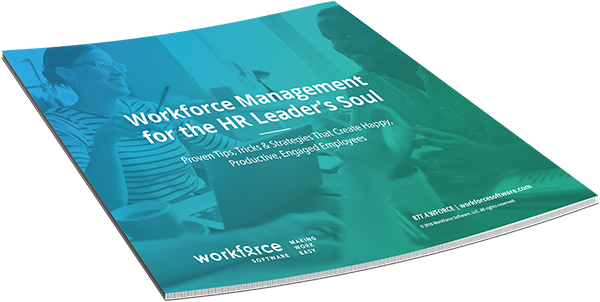Create Lasting Work Relationships: A Crash Course in Emotional Intelligence

John walked into his office, hot and exhausted from the commute.
“It’s a scorcher … again,” John said to Greg, his colleague.
“Yeah, it is, but it’s supposed to cool down tomorrow,” said Greg, looking up from his email, giving John a and a smile.
John nodded and made for the kitchenette. Greg continued writing.
What’s this brief conversation really about?
Some people would say it’s about the weather—and they’d be wrong.
This exchange is actually about emotions, feelings. Here’s the conversation’s underlying translation:
John: “This heatwave is depressing me and stressing me out.”
Greg: “I know how you feel because I’m living through the same thing, but cheer up because things are looking up.”
And just like that, John and Greg were able to express themselves, bonding over mutual emotions without ever vocalizing them. It’s a valuable skill at work and in life, made possible by something called EQ, or emotional intelligence, which we all have in varying amounts.
“EQ makes it possible for meaningful conversations to masquerade as trivial pleasantries.”
Subscribe to The WorkForce Blog
Learn the art and science of maintaining productive, happy, engaged employees.
Emotional intelligence, in part, allows people to read between the lines. It helps people pick up hints that make it possible for meaningful conversations to masquerade as trivial pleasantries. There’s no escaping it, either. We constantly use our EQ, whether we’re at brunch with a friend, at lunch with a colleague, or at dinner with a prospect.
Except, according to science, EQ is actually more important to workplace success than IQ.
Imagine if Greg did not respond sympathetically to John’s gripe. If he merely shrugged his shoulders and continued to write his email, dismissing John’s comment because he didn’t understand its true purpose: to create a subtle, yet important, connection.
Now imagine if a manager acted that way…
Effective workforce management is dependent on EQ.
Because happy, productive, engaged employees get that way by feeling appreciated and understood; connected not only to the processes that dictate their work-life balance but, also, to the leaders they’re in place to support.
Leaders constantly miss these opportunities to connect, to be flexible, to be transparent. It happens for all sorts of reasons—and EQ lapses are at the top of that list, costing companies all over the world trust equity (not to mention talent and money).
That’s why it’s so critical to understand emotional intelligence: what it is, why it matters, and how to develop it over time. Feel free to start learning all of that right here, right now…
Emotional Intelligence: A Breakdown
According to Travis Bradberry, co-author of Emotional Intelligence 2.0, EQ is “made up of four core skills that pair up under two primary competencies.”
Here’s Bradberry’s breakdown of each:
1. Personal Competence: “ability to stay aware of your emotions and manage your behavior and tendencies.”
- Self-awareness: “ability to accurately perceive your emotions and stay aware of them as they happen.”
- Self-management: “ability to use awareness of your emotions to stay flexible and positively direct your behavior.”
2. Social Competence: “ability to understand other people’s moods, behavior, and motives in order to improve the quality of your relationships.”
- Social Awareness: “ability to accurately pick up on emotions in other people and understand what is really going on.”
- Relationship Management: “ability to use awareness of your emotions and others’ emotions to manage interactions successfully.”
Those are the building blocks of emotional intelligence, which, when combined with our personalities and IQ, make us who we are…
EQ + IQ + Personality = Individuality
We are all the sum of three completely distinct attributes:
1. Personality: determined by our innate preferences.
For example, do you enjoy staying in on the weekends or going out? Do you favor dressing up or down? Do you prefer watching war epics or romantic comedies? These questions speak volumes about one’s personality, which typically remains constant over the course of a lifetime.
2. Intelligence Quotient: determined by our ability to learn.
In other words, how quickly and easily can you internalize and use the information you’ve read, seen, and/or heard? Like personality, IQ rarely fluctuates over the course of one’s life.
3. Emotional Intelligence: determined by a malleable set of soft skills (self-awareness, self-management, social awareness, and relationship management). Unlike personality and IQ, emotional intelligence can be changed, developed, and improved over time, which is a good thing because…
Of the three, EQ has the biggest impact on your work performance (and pay).
Emotional intelligence is the bedrock that supports dozens of important skills, most of which are essential to success at work: stress tolerance; anger management; empathy; assertiveness; trust; time management; decision-making; teamwork; customer service; flexibility; accountability.
More generally, studies have shown that higher EQ can improve a person’s health, happiness, and humor.
“The link between emotional intelligence and earnings is so direct that every point increase in EQ adds $1,300 to an annual salary,” says EQ expert, Travis Bradberry. “These findings hold true for people in all industries, at all levels, in every region of the world.”
How to develop and increase your EQ:
You can test your EQ, for free, here.
Now, let’s be clear: your score is the product of deeply ingrained characteristics, values and ideals that were developed during your formative years—not to mention your genetics. So you can’t expect to improve your EQ overnight. It’s a steady process, one that will require your commitment and concentration.
When you’re ready to buckle down, here are several ways to get the ball rolling:
1. Read: How to Win Friends & Influence People.
Almost eight decades after its publication, Dale Carnegie’s classic book about conquering social interactions is as relevant and valuable as the day it came out. That’s because the human condition is constant. Our psychology evolves, of course, but slowly, at a snail’s pace.
How to Win Friends & Influence People breaks down dozens of interpersonal adjustments that we can all make to better connect with people. It’s a fantastic start that’ll put your current emotional behavior into perspective.
Click here to read the entire book.
2. Make time for “true” reflection.
It’s proven: humans have a hard time with honest, accurate self-evaluation.
We tend to think we’re smarter than we are. We also think we’re more pleasant than we are, more interesting, more charming, more profound. That lack of self-awareness, unfortunately is often at the center of our interpersonal conflicts, which is why setting aside time for honest, “true” reflection is necessary to spur genuine change.
“Setting aside time for honest, ‘true’ reflection is necessary to spur genuine change.”
You can do this at the end of each day by writing down at least three things you could’ve done or said differently, better. Think back to your group meetings and one-on-one conversations: what would you change?
Putting your stumbles down on paper will make them real, forcing you to evaluate them instead of pushing them back into your subconscious. But don’t dwell. Learn and move on.
 Workforce Management for the HR Leader’s Soul
Workforce Management for the HR Leader’s Soul
This book will help you create a healthy, rewarding environment for the people that keep your company moving forward.
3. Actively strive to change your perspective.
They say that achieving significant weight loss is the product of a lifestyle overhaul, not a mere adjustment in diet and exercise. In other words, achieving and sustaining physical change demands a big-picture change, not a simple diet-and-exercise adjustment.
The same principle applies to emotional intelligence: it requires a shift in attitude and perspective. Here are a few things to remember as you work to enable that shift:
Leaders roll with the punches. That means be flexible, especially if you’re managing a team. Gracefully adjusting to changing circumstances is the mark of a mature, emotionally sound leader. Hourly employees, for example, are often pinned between rigid schedules and life’s unpredictable moments. Emotionally intelligent leaders realize that, empathize, and strive to make work easier as a result.
Negative assumptions are destructive. By giving others the benefit of the doubt, you’re making a conscious effort to look at their actions objectively, in a depersonalized way. For example, if your colleague is slow to respond to an email, don’t assume she’s ignoring you when it’s entirely possible that she’s inundated with work.
Everyone is dealing with life. If you’re being mistreated by a difficult, unmanageable person, try to be empathetic to their reality, their issues. And if the person is a stranger, remind yourself that they may be distracted by something personal. It doesn’t excuse their abuse, but it’s a reason-why that’ll help you cope and take the high road.
Remember John and Greg?
A couple months ago, they met as colleagues. Today, they sit across from each other as friends.
Their healthy, constructive relationship is the product of countless micro-connections, made possible by their acute self-awareness and self-management; by effective social awareness and relationship management.
These are the soft skills they’ve developed and honed over time, skills that now help them work more efficiently together, with less stress. Skills you can develop by committing to some of the concepts and best practices discussed in this article.
Good luck—and remember that it’s never too late to start anew.
Make work easy.
Give your employees (and yourself) the gift of
WorkForce Management Software.

 Workforce Management for the HR Leader’s Soul
Workforce Management for the HR Leader’s Soul